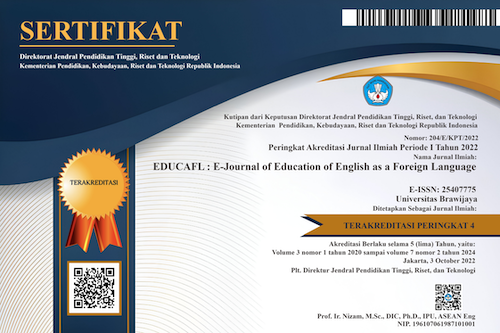Identifying and addressing implicature of politicians’ statement on climate change found in Headline news of the Jakarta Post Newspaper
DOI:
https://doi.org/10.21776/ub.Educafl.2019.002.1.3Keywords:
education, implicature, pragmatics, climate changeAbstract
Abstract. This study uses qualitative content analysis to examine the statements made by politicians in the Jakarta news headline post Jokowi era, and find out the implicature contained in the statements made by politicians on climate change in Indonesia. The study found that the statements made by these politicians had a high level of consideration of the scientific, social and ethical aspects of climate change and there were many implicature contents. Most importantly, the findings show that many statements refer to the discourse of multidisciplinary climate change discourse. Based on the findings, this article shows that the categories of implicatures produced in the headline news corpus data of the Jakarta Post climate change can be developed by adopting guided inquiry.
References
REFERENCES
Adger, W. N., Barnett, J., Chapin, F. S., & Ellemor, H. (2011). This Must Be the Place: Underrepresentation of Identity and Meaning in Climate Change Decision-Making. Global Environmental Politics, 11(2), 1–25. https://doi.org/10.1162/GLEP_a_00051
Boykoff, M. T. (2008). The cultural politics of climate change discourse in UK tabloids. Political Geography, 27(5), 549–569. https://doi.org/10.1016/j.polgeo.2008.05.002
Corbett, J. B., & Durfee, J. L. (2016). Testing Public (Un)Certainty of Science: Media Representations of Global Warming. Science Communication. https://doi.org/10.1177/1075547004270234
Perdhani, W. C. (2013). IMPLICATURE USED AT THE POLITICS NEWS OF THE JAKARTA POST, JAWA POS NEWSPAPER AND ITS PEDAGOGIC IMPLICATIONS. Erudio Journal of Educational Innovation, 1(2). Retrieved from http://www.erudio.ub.ac.id/index.php/erudio/article/view/120
Qualitative Data Analysis. (n.d.). Retrieved from https://books.google.com/books/about/Qualitative_Data_Analysis.html?id=3CNrUbTu6CsC
Svihla, V., & Linn, M. C. (2012). A Design-based Approach to Fostering Understanding of Global Climate Change. International Journal of Science Education, 34(5), 651–676. https://doi.org/10.1080/09500693.2011.597453
Tolppanen, S., & Aksela, M. (2018). Identifying and addressing students’ questions on climate change. The Journal of Environmental Education, 49(5), 375–389. https://doi.org/10.1080/00958964.2017.1417816
Watson, R. T., Albritton, D. L., Intergovernmental Panel on Climate Change, Intergovernmental Panel on Climate Change, & Intergovernmental Panel on Climate Change (Eds.). (2001). Climate change 2001: synthesis report. Cambridge ; New York: Cambridge University Press.
Weingart, P., Engels, A., & Pansegrau, P. (2000). Risks of communication: discourses on climate change in science, politics, and the mass media. Public Understanding of Science, 9(3), 261–283. https://doi.org/10.1088/0963-6625/9/3/304
Downloads
Published
Issue
Section
License
Authors who publish with this journal agree to the following terms:
- Authors retain copyright and grant the journal right of first publication with the work simultaneously licensed under a Creative Commons Attribution License that allows others to share the work with an acknowledgement of the work's authorship and initial publication in this journal.
- Authors are able to enter into separate, additional contractual arrangements for the non-exclusive distribution of the journal's published version of the work (e.g., post it to an institutional repository or publish it in a book), with an acknowledgement of its initial publication in this journal.
- Authors are permitted and encouraged to post their work online (e.g., in institutional repositories or on their website) prior to and during the submission process, as it can lead to productive exchanges, as well as earlier and greater citation of published work (See The Effect of Open Access).



